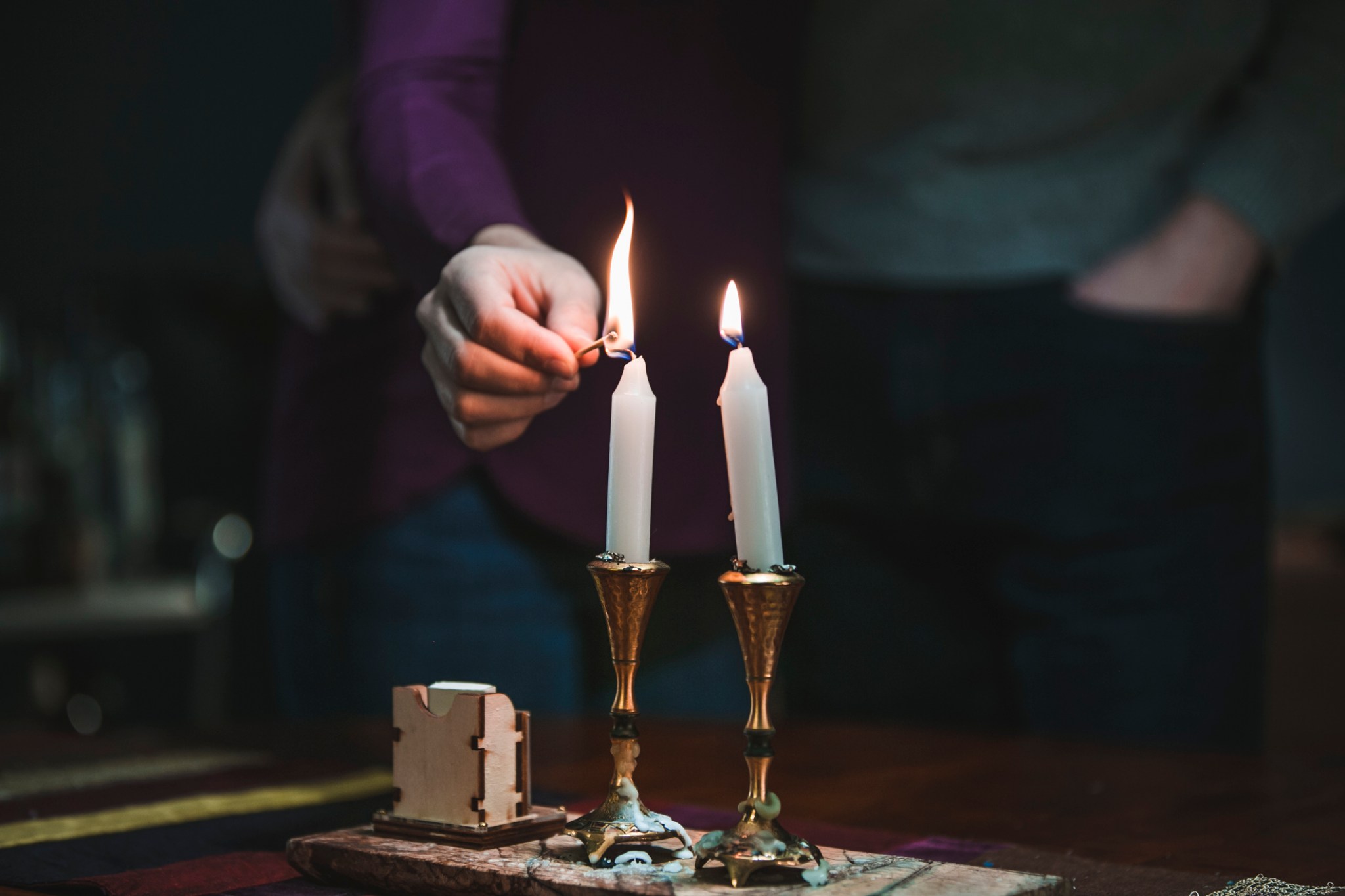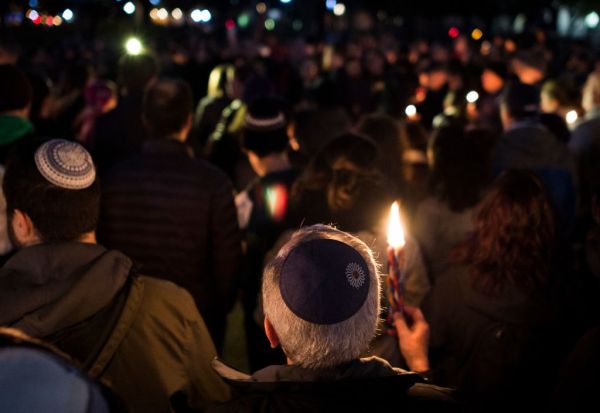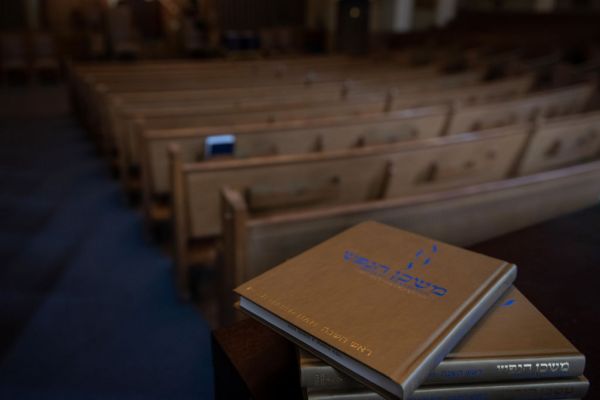Happy Sunday! The irony of the timing of this newsletter’s publication—Sunday morning—isn’t lost on this Presbyterian. It hits inboxes while many of our Christian readers—including me—are getting ready to head to worship services and later observe Sabbath rest.
Early in our marriage, my wife and I read a book that helped us appreciate observing the Sabbath for worship and rest not just as another spiritual discipline to be checked off the list, but as a gift—to truly rest in the belief that God has provided and will provide, even as our to-do list seems to only get longer.
Rabbi Seth Adelson says much the same about Shabbat in today’s essay, highlighting connections between Sabbath observance and the cosmos.
Seth Adelson: We All Could Use More Sabbath Fundamentalism

On October 7, 2023—a Saturday—I woke up as I usually do on a Shabbat morning: without an alarm clock. While opinions differ in today’s Jewish world over the permissibility of electronic devices during the 25 hours of the Sabbath, from sunset on Friday evening until dark on Saturday night, I generally avoid using them.
As I enjoyed my regular Shabbat-morning quaff of yerba mate, prepared with hot water from an urn set up on Friday afternoon, I perused the morning paper in print, delivered the old-fashioned way. If I gleaned anything of importance that morning from the news, it was soon completely obliterated by what I heard from congregants when I arrived at my synagogue to begin the morning service. That day was not just Shabbat, but also a lesser-known festival known as Shemini Atzeret, effectively the eighth day of the harvest festival of Sukkot, and the precursor to the celebration of the foundational text of monotheism known as Simḥat Torah, the rejoicing of Torah.
On that evening, as Jews around the Diaspora attempted half-heartedly to dance and sing with the Torah, as is the custom when we complete the cycle of reading and start over from Genesis again on Simḥat Torah, our hearts were far away, and already mired in mourning and confusion and pain. While much of the world was surely glued to their devices on October 7, observant American Jews were not, even on October 8, since Simḥat Torah is also a day on which we refrain from certain weekday behaviors. We sorely wanted to know what was happening on the ground in Israel with all the detail that our instant, seemingly infinite digital connectedness can provide. Yet we waited until Sunday night.
We were busy with the end of Deuteronomy and the beginning of Genesis.
The Torah, of course, opens with two distinct stories of creation: Chapter 1 recounts the orderly seven-day creation story, concluding with Shabbat, and the next chapter tells us about Adam and Eve, arguably a more human, more personal story. But the inclusion of both suggest that our lives are shaped daily by creation.
Rashi, the illustrious 11th century French Jewish commentator, asks the essential question up front about creation: Why start here? Why didn’t the Torah, ostensibly a behavioral code, begin with the lawgiving passages of Exodus, specifically 12:2: “This month shall mark for you the beginning of the months; it shall be the first of the months of the year for you.”
And Rashi answers himself by saying that the reason the Torah starts with creation is that it is of utmost importance for all of us to know that God created the world: “If the nations of the world should say to Israel, ‘You are thieves! You have conquered the land belonging to the seven nations of Canaan,’ they can reply, ‘The whole world belongs to the Holy One. He created it and gave it to whomever He wanted to. He first willed to give it to them, and then He willed to take it from them and give it to us.’” (translation from The Commentators’ Bible by Michael Carasik.)
That is a fundamental aspect of our existence. Although Rashi and I would most likely disagree on particulars, I believe him to be correct. The premise that God’s metaphorical hand is active in the world, in its creation and ongoing functioning, is clearly a cornerstone of Jewish tradition, no matter how we read the creation narratives. Knowing that God created the world is fundamental.
I have to concede that I am a fundamentalist. No, not like what you’re thinking of when you hear that word: I’m not a literalist, not an extremist, not an ultranationalist, not one who shuns modernity. Rather, I am a fundamentalist in that I believe that what we need to focus on, in this world of infinite choice and limited time, are the fundamental aspects of Judaism: Shabbat (Sabbath), kashrut (holy eating), Talmud Torah (learning the words of our tradition and making them come alive today), ritual (connecting our actions and thoughts and feelings with our tradition), and community.
Shabbat is first on the list for so many reasons, not the least of which is that it is “created” in the beginning of the Torah. When we chant the opening verses of Genesis on Simḥat Torah, right after we finished the end of Deuteronomy, we conclude with Genesis 2:1-3:
The heaven and the earth were finished, and all their array. On the seventh day God finished the work that had been undertaken: He ceased on the seventh day from doing any of the work. And God blessed the seventh day and declared it holy—having ceased on it from all the work of creation that God had done.
We also chant this twice every Friday evening: once in the synagogue service, and once at home right before reciting the sanctification of the day over a cup of wine at the Shabbat dinner table. The framers of Jewish tradition thought it to be fairly important. And they were right. Shabbat is the keystone of Jewish life.
Something I hear over and over from congregants, and, well, from everybody, is that we simply do not have enough time. Would that there were only a few more hours in the day, a few more days in the week.
It’s obvious how unhealthy that is. I don’t need to quote any academic studies or articles to tell you that we are all overworked, underslept, overtired; that we don’t spend enough time with our families; that we don’t have time to eat properly; that we feel overwhelmed by the constant noise, the constant feeling of go-go-go; that we are constantly assaulted with paid messages vying for our attention, and thereby our time.
I am as busy as anyone else. My family is as crazed as yours, with pickups and dropoffs and music lessons and dance lessons and back to school night and everything else. Yet my family and I all manage to shut down for Shabbat. No appointments. No shopping. No Instagram. No television.
And you know what? It’s fantastic.
Our ancestors knew this, and even though they didn’t have social media or TV or cars or smartphones, they understood the value of shutting down every seventh day.
For thousands of years, Jews have been taking advantage of the seventh day as a priceless opportunity of dining together with friends and family, of reconnecting in real time, of learning a little something of Jewish tradition, of holy eating, of expressing gratitude for what we have, of spending precious moments reciting ancient words of liturgy.
One of the early secular Zionist thinkers, Aḥad Ha-Am, observed, “More than the Jews have kept Shabbat, Shabbat has kept the Jews.” Rabbi Abraham Joshua Heschel, the esteemed 20th century Jewish philosopher, was a teacher of my teachers at the Jewish Theological Seminary of America. In his infinitely ethereal prose, he called Shabbat a “palace in time” and in his masterful ode to the seventh day titled The Sabbath, he said:
On the Sabbath it is given us to share in the holiness that is in the heart of time. Even when the soul is seared, even when no prayer can come out of our tightened throats, the clean, silent rest of the Sabbath leads us to a realm of endless peace, or to the beginning of an awareness of what eternity means. There are few ideas in the world of thought which contain so much spiritual power as the idea of the Sabbath.
Those of us who do it every week know that God’s having rested on the seventh day is as meaningful as God’s having created the world in the first six. But the beautiful thing about it is that anyone can reap the benefits of intentional rest.
You wonder: Aren’t the Sabbat restrictions—39 categories of prohibited forms of work, according to the Talmud—severely oppressive? Don’t we get bored? How can we survive without spending money, or drinking a cappuccino, or throwing a picnic basket in the car to head out to a distant park? For Jews, there are always local, Shabbat-friendly pleasures.
But furthermore the key is to lean into Heschel’s “realm of endless peace.” Shabbat is a taste of a world that could be, a 25-hour glimpse into a healthier, less stressful and more even-keeled existence. Sure, I wonder what I might be missing. I certainly longed for news on October 7. But that peaceful realm, when you have seen it, is powerfully seductive. It allows you to let go, to lose sight of the give-and-take of Sunday through Friday, and just breathe, and accept, and enjoy. By mandating a pause, Shabbat enables us to see once again the beauty of creation, to return to the simplicity which God gave us, stripped of human elaboration.
To borrow from an old ad campaign, you don’t have to be Jewish to observe Shabbat. All you have to do is turn things off, and tune in to the people and the world around you for one day a week. And would it kill you to reconnect with the house of worship of your choice? God knew, in creating the world, that people would need a Sabbath, and that is more true now than ever.
More Sunday Reads
- As some social and religious conservatives are growing more concerned with the Republican Party’s shifting commitment to the pro-life cause, a new party, steeped in Catholic social doctrine, is becoming more well-known. The Pillar published an interview Friday with Peter Sonski, the presidential nominee of the American Solidarity Party, in which he explained the group’s commitment to what in some places is known as “Christian democracy.” “I think the foundation is concern for human life and human dignity,” Sonski told The Pillar. “Everything in public policy, if you stop to think about it, is geared toward human beings. Is it education? Is it the environment? Is it commerce? Is it international defense or international relations? All of those things are really focused on the good of individuals and hopefully the common good — the good of our entire society. That’s the premise of the ASP, and it’s the premise of Catholic social teaching, that we are concerned about the good of the individual, the good of the family, and that human flourishing has to be identified in several ways.”
- This week the Ukrainian parliament effectively banned the Russian Orthodox Church, which Ukrainian leaders have accused of aiding Russia in its war of aggression against their country. As Katherine Kelaidis explains for Religion News Service, the ongoing war between Russia and Ukraine has drawn in both the Russian Orthodox Church, which has long maintained influence in Ukraine, and the Ukrainian Orthodox Church (UOC). “The truth is that Ukraine finds itself in a nearly impossible situation with respect to the UOC. On paper, at least, the UOC is an independent and fully Ukrainian church. It is also the church of many ordinary Ukrainians, who for whatever reasons (including language, habit, canonical and traditional loyalties) remain part of the besieged jurisdiction. At the same time, nearly everyone knows that the UOC’s independence is shallow at best, perhaps merely window dressing, and that while the UOC has supported Ukrainian soldiers and refugees, at least some UOC clerics are involved in efforts to undermine the Ukrainian cause and promote Russian ideology.” (For more on this and other issues within Orthodox churches, check out The Pillar’s recent interview with Ecumenical Patriarch Bartholomew I of Constantinople, the leader of the Eastern Orthodox Church.)
A Different Kind of Sunday Show
For this week’s video podcast, I talked to Cato Institute Senior Fellow Mustafa Akyol about his recent Dispatch Faith essay, “We Don’t Have to Choose Between Religion and the Enlightenment.” We also spent a fair amount of time talking about Islam and its compatibility with classical liberalism. Head over to our YouTube channel to see it and feel free to share!
A Good Word
As a variation on a Dispatch Faith theme, for Christianity Today, Aryana Petrosky writes about how ordering her time according to certain spiritual disciplines—including Sabbath observance—helped her and a group of fellow congregants to “number our days and be fully attentive to how we spend out time in light of eternity.” She also writes: “The cumulative effect of consuming less, only ‘whatever is true, whatever is noble, whatever is right, whatever is pure, whatever is lovely, whatever is admirable,’ was liberating. Instead of cramming in more content on my metro rides or during my evenings home, I was given a moment to be still with my thoughts, and when prompted, to pray—a provocation I might have missed if I was tapping on my phone or watching Netflix. But it was the community that made the real difference. On the days we met as a group, time lost its structure entirely as we became absorbed in each other’s stories. We empathized with just how difficult these practices were to incorporate and encouraged each other in our shared earnestness to inhabit time in a new way.”









Please note that we at The Dispatch hold ourselves, our work, and our commenters to a higher standard than other places on the internet. We welcome comments that foster genuine debate or discussion—including comments critical of us or our work—but responses that include ad hominem attacks on fellow Dispatch members or are intended to stoke fear and anger may be moderated.
With your membership, you only have the ability to comment on The Morning Dispatch articles. Consider upgrading to join the conversation everywhere.